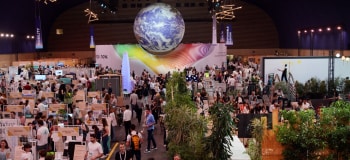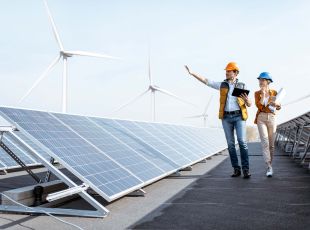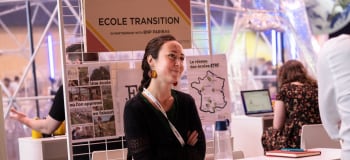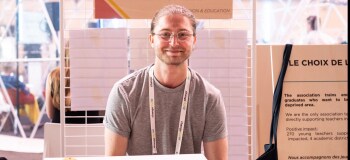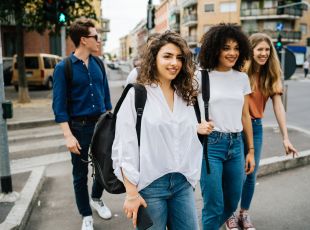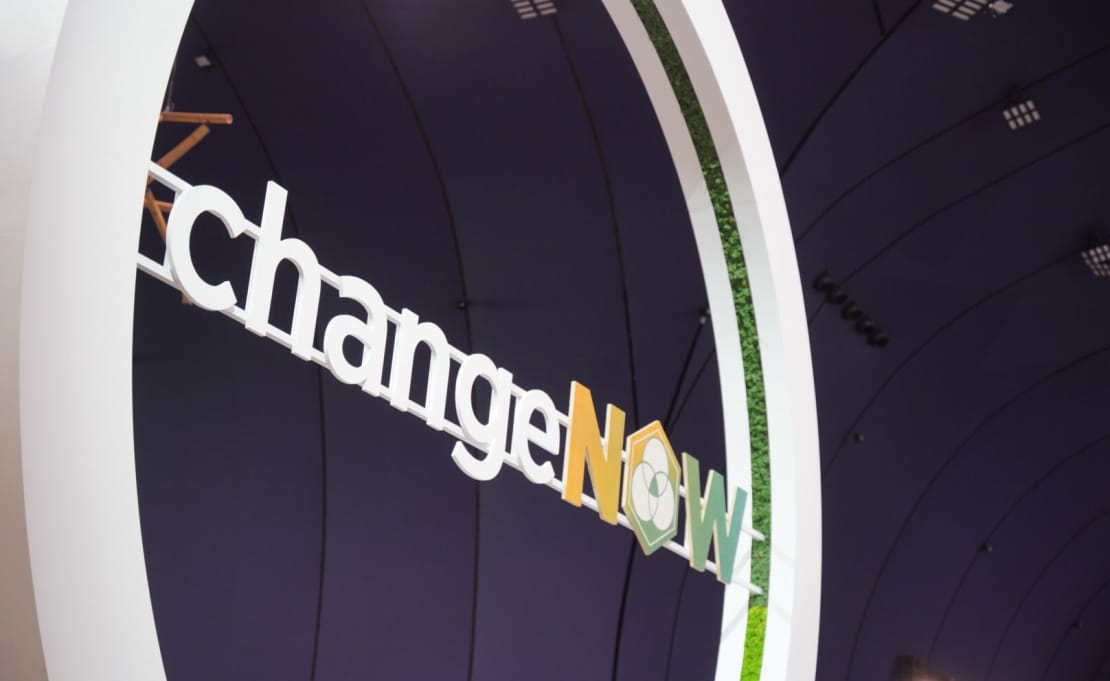Thursday 19 May: taking action, together
How can we take action in times of crisis? Could one of the keys be rethinking public-private partnerships? That’s the question up for debate at the first conference, which examines collaboration between the French Red Cross and Axionable. The latter works to put data and artificial intelligence at the service of sustainable and social causes in order to effectively help the 70,000 Ukrainian refugees in France. UNICEF's Partnerships Officer, Luc Chauvin, summarises the topic as follows: “NGOs need to work with private companies, which have skills we don't necessarily have!”
“Global citizenship education is one of the most powerful levers for reorienting our way of life.”
Stefania Giannini, UNESCO Paris
On the way to the next conference, you cannot miss the rows of stand from engaged companies and startups on biodiversity, agriculture and food, mobility, fashion, health. Discussions on topics like education can be overheard as you head out of the room.
Satish Kumar, an activist for peace and former monk, founded the Schumacher College in England so that students could hear from the best minds and activists on ecology and social justice, to meditate as well as have space to reconnect with nature. “Our education system, our great universities and our schools were designed in the nineteenth and twentieth centuries. But, today, we are in the 21st century! We need an education that focuses on art, nature and man, not just money. Nature is our master,” Kumar explains. Like him, most speakers at this conference believe that change must be made through education.
Stefania Giannini, Deputy Director General of UNESCO for Education also believes this. She explains her view in these terms: “Our vision of education is human, non economic; it is not competitive, it is transformative. What we call global citizenship education is one of the most powerful levers for reorienting our way of life, and securing the future of our planet.”
A response that calls for applause, but it is on to the next conference: “The race to zero and beyond.” It brings to the stage several speakers who question how we can go beyond net-zero objectives in order to achieve carbon neutrality by 2050. Kumi Kitamori, Head of Green Growth and Global Relations at the OECD, reiterates the need for collaboration: “Governments cannot solve the problem on their own. Companies need to help them, we need to push the limits of innovation!”
“BNP Paribas has built a strong corporate culture around environmental issues.”
Antoine Sire, Head of Company Engagement, BNP Paribas
Antoine Sire, Head of Company Engagement, BNP Paribas, shares his experience: “We started funding climate research in 2010. Few companies have as many goals as we do! Three or four years ago, people in the banking sector asked us why we were making this choice. BNP Paribas built a real corporate culture around ecological issues, and no one asks why anymore... Our customers are changing. Individuals and corporates now want something different. We want to be the ones who help them find it.”
Friday 20 May: climate justice and social inclusion
“Our planet is the only planet that hosts life in the universe. We are part of it, it is part of us. What are we doing?” It is with this question that Kate Raworth, an ecological economist, famous for her “Donut Theory” combining environmental integrity issues with social justice, opens the second day of the event. “The march of progress is not unbridled growth. Progress means finding balanced prosperity,” she says before citing the example of engaged cities, such as Amsterdam, which has taken advantage of Donut Theory in order to aim for a fully circular economy by 2050.
“Experts know how to turn the tide, how to put the planet back on the path to well-being.”
Jonathan Jennings, Health in Harmony
Those efforts, however, will not be enough in many areas. The Polynesian archipelago of Tuvalu could disappear within 50 to 200 years, due to rising waters. For its foreign minister, Simon Kofe, this is, “The reality of climate change, [whose] urgency may not be seen by those living in the most developed countries.”
So what can we do to counter the ongoing ecological disaster? Activist Dominique Palmer responded as follows: “My approach to climate justice is to focus on the fundamental principles: Everyone has the right to a healthy environment, access to clean air and green spaces. The most marginalised, and most affected, should be able to take part in decisions and be listened to.” For Jonathan Jennings, founder of the NGO Health in Harmony, “There are also experts who know how to turn the tide, who know how to put the planet back on the path of well being.”
“Being a philanthropist means taking time and taking risks.”
Isabelle Giordano, Head of the BNP Paribas Foundation
Saturday 21 May: young people help the planet
To close the summit, we put the focus on youth engagement for climate. This final day, which is aimed more at the general public, starts at the Grand Palais Ephémère, with the conference “Young people are shaking things up within the company,” in which two BNP Paribas employees participated. Pauline Blandin of Principal Investments says: “My job is to have a real impact. For this, we look at the intentionality of companies, what they bring concretely, and the measurability of their impact.” For Célia Deschamps, ESG Risk Specialist within the Group's CSR team, “We are beginning to overcome the idea that the transition is in conflict with profit. Banks with a global presence manage an immense portfolio of clients - that's their leverage.”
“Every individual can have an impact on the planet every day.” jane goodall
Now, we are heading towards Jane Goodall's conclusion: “Every individual can have an impact on the planet every day. We now have to choose what impact we want to have.” A very representative message for this event that fills this Saturday evening with positive energy!
Change Now 2022 in figures
investors
sought
countries represented
Just some of the noteworthy speakers
Ethologist and anthropologist Jane Goodall, director of Don't look up Adam McKay, director of the Company Engagement at BNP Paribas Antoine Sire, CEO of Orange Christel Heydemann, Head of Corporate Philanthropy and General Delegate of the BNP Paribas Foundation Isabelle Giordano, co founder of Back Market Vianney Vaute, indigenous Cheffe Kowawa Apurinein, world renowned economists Kate Raworth and Esther Duflo...


